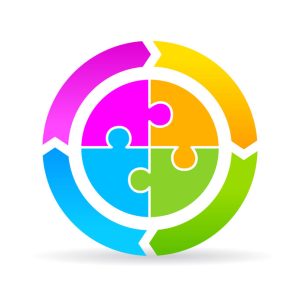
Fitness programming is equal parts science and art. Successful fitness program designs are those that reflect the goals and needs a client expresses and serves to help the client achieve an optimal and realistic life balance.
It’s not just about physical gains or losses; it’s about thoughtfully applying tactics that help clients engineer a better life. In short, fitness programming is about total life fitness.
Let’s not limit the programs we create to sets and reps. Instead, let’s examine a client’s level of wellness and his or her life balance.
Why Multidimensional Fitness?
Our clients are multidimensional – they are parents, professionals, hobbyists, creators, friends, leaders, etc. They are real people with real challenges and struggles. Such challenges often manifest as physical issues like weight gain, poor appetite, and anxiety.
Because our clients are individuals with unique stories, our approach as fitness professionals should be equally as unique, comprehensive, and considerate.
Understanding the Dimensions of Wellness
Typically, wellness is defined as the interrelationship between five to eight different areas or “dimensions”. Depending on the source of information or expert, the areas can vary.
Commonly included are the following dimensions: physical, social, emotional, intellectual, environmental, occupational, and spiritual.
- Physical – pertains to the body and an individual’s physical health.
- Social – the ability to relate to others and form relationships
- Emotional – pertains to emotional intelligence and the ability to understand ourselves
- Intellectual – a desire to learn new concepts and grow
- Environmental – the ability to recognize our responsibility in preserving and/or helping the environment
- Occupational – the ability to derive personal satisfaction from one’s career or role
- Spiritual – the ability to strike balance, harmony, and peace in life (not related to a religious affiliation)
Think of each dimension as a puzzle piece. If one piece is missing, the picture isn’t complete. The same is true for areas of personal wellness; when one area is diminished or absent, other areas are impacted and an individual’s wellbeing is incomplete.
The goal is to help clients strike a balance so that they can achieve an optimal level of wellness.
What does a comprehensive fitness program include?
There’s no black and white answer here – just many shades of gray. To effectively design a comprehensive fitness plan for a client, consider gathering information on the following areas of a client’s life.
- Physical fitness goals
- Barriers to achieving desired goals
- Sleep Fitness
- Stress management (what causes stress and what is the reaction)
- Hunger and appetite (two separate concepts)
- What a typical day looks like for a client
- Social support opportunities
- Home and work environments
- Past experiences with exercise and activity
- Perceptions of a balanced life (what does it look like to your client)
The most effective fitness program for your individual clients is one that attempts to address the areas that a client is experiencing conflict or a lack of harmony.
While clients come to personal trainers to change something physical, the achievement (or not) of a health goal is influenced (and sometimes predicted) by other variables (quality of sleep, social support resources, perceptions, workplace culture, etc.).
By investing time up front with a new client to learn about multiple areas outside of the physical activity and nutrition areas, you will develop a greater sense of what may be impeding a client’s intended progress.
Work with other qualified professionals in your network to address issues or areas that are outside of your professional scope. For example, if a client appears to be suffering from depression (mental health/wellness puzzle piece), consulting a mental health professional is the appropriate path to take.
You, as a fitness professional, are capable of much more than training the physical dimension. You are capable of coaching your clients towards lifestyle balance.
[info type=”facebook”]Join the Facebook Community Group to meet other trainers.[/info]
Dr. Erin Nitschke, NFPT-CPT, NSCA-CPT, ACE Health Coach, Fitness Nutrition Specialist, Therapeutic Exercise Specialist, and Pn1 is a health and human performance college professor, fitness blogger, mother, and passionate fitness professional. She has over 15 years of experience in the fitness industry and college instruction. Erin believes in the power of a holistic approach to healthy living. She loves encouraging her clients and students to develop body harmony by teaching focused skill development and lifestyle balance. Erin is also the Director of Educational Partnerships & Programs for the NFPT. Erin is an editorial author for ACE, IDEA, The Sheridan Press, and the Casper Star Tribune. Visit her personal blog at belivestaywell.com

